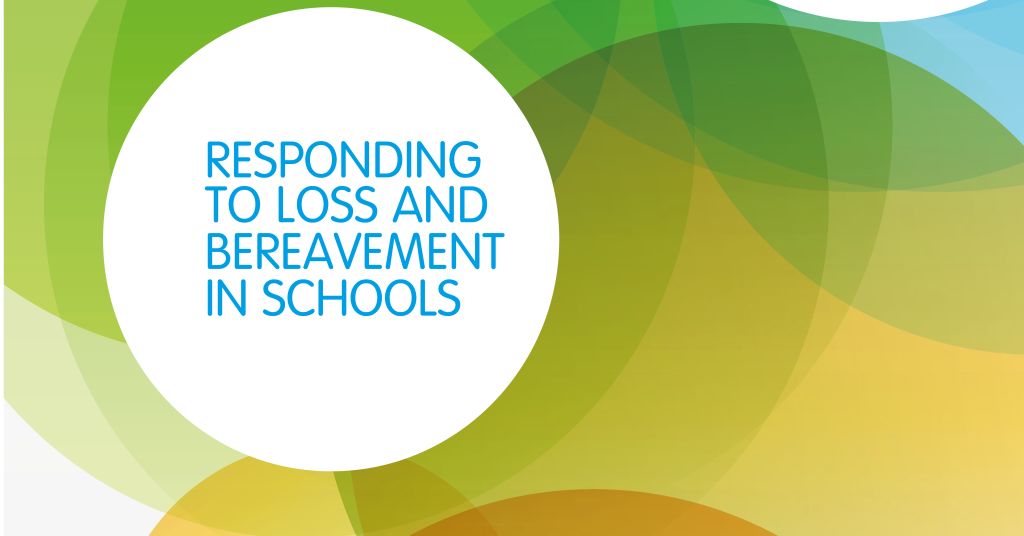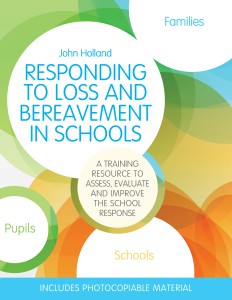With an established background in psychology and education, author John Holland has written numerous books for JKP about bereavement and loss. In this blog, John gives insight on his firsthand experience in working with bereaved children in schools – which also happens to be the core topic of his newest book Responding to Loss and Bereavement in Schools.
Do you ever wonder what could have happened if you had made different life choices, a bit like in the film Sliding Doors? Around 30 years ago I took a leap of faith, moving away from a career as a chartered surveyor – with an interest in economics – and beginning a career as an infant school teacher – an environment in which I further developed my interest in psychology. This career change caused bemusement in both former and new colleagues. I followed my instincts and decided to move into a more people-focussed setting; although I had enjoyed my surveying career, it was time for a change!
It is interesting how things unfold. My interest in psychology and child development can be traced back to the birth of my daughter, and the undertaking of a basic Open University course. This would then lead me into education, and ultimately into becoming an educational psychologist.
It is easy and tempting to retrospectively ‘join the dots’ after these events, but I was surprised to find a natural flow from psychology to an interest in the effects of death and loss on children. Loss, such as parental divorce and separation, is currently an issue in schools – like the Infant and Nursery School where I worked. In addition, the encouragement of friends, and learning about their experiences around death spurred me on.
I had not seriously considered this subject before; living in a village where the cycle of life is more obvious, and having parents who supported me in the rites after a death, meant that my experiences had not been detrimental to my health.
Why do we have problems dealing with death? Death is often taboo – people may even cross the road to avoid a conversation on the topic – so it was important to provide a social context in Responding to Loss and Bereavement in Schools which would allow this issue to be more easily approached.
I initially used an action research model to look into how schools supported pupils after they had experienced a death, initially in the primary sector before moving onto the secondary sector. The research revealed that schools generally rated the area as an important one, but they had little skill and exposure to limited training in dealing with such instances.
In response I wrote Coping with Bereavement – A handbook for teachers, which was aimed at individual teachers who were interested in developing their skills in this area. On reflection the title may seem ironic, as some schools seemed not to be coping!
I next turned to the experiences of bereaved pupils through a doctoral study at the University of York. ‘Iceberg!’ hinted that much may be hidden below the surface when dealing with bereavement. This led to the JKP book Understanding Children’s Experiences of Parental Bereavement and again, no irony was intended, but I found that some schools did not fully understand the impact of the death of a parent on a child.
Have you wondered how long the effects of bereavement last? Some models of loss suggest that both children and adults will ‘resolve’ loss relatively quickly, and that things will soon return to ‘normal’. Anyone who has had a significant loss will know that this is not the case, and Responding to Loss and Bereavement in Schools will help schools to consider support in the short-, medium- and long-term of the process, with the emphasis placed on key moments where action needs to be taken.
The second and third JKP books were Supporting Children in Public Care in Schools and Lost for Words; both of which were written to provide awareness training. Lost for Words, in particular, was aimed at bereavement in schools, and helping staff to gain a basic understanding of loss, grief, and how to respond. Supporting Children in Public Care in Schools did what it said on the tin; providing a basic understanding of the area to staff who lack any prior knowledge of the subject.
Lost for Words was a more enigmatic title, we settled on this after working titles including ‘Pictures of Lily’ and ‘The Slow Boat to China’ were considered. Lost for Words reflected the difficulty that adults have, at times, of knowing what to say to bereaved children, as well as bereaved adults.
I think that the title, Responding to Loss and Bereavement in Schools, is clear in its intent. It represents a quantum leap in terms of schools helping their pupils, as it enables them to carry out an audit of their response to bereaved pupils, and from that analysis guides them towards providing their own internal training program to respond to their pupils.
How can parents and carers be involved in supporting their children after a loss? Responding to Loss and Bereavement in Schools builds upon an existing body of research to help schools to engage with parents and maintain this relationship, leaving nothing to chance and understanding the key role played by parents and carers in responding to a bereaved child.
This should mean that the school and family are working collaboratively, developing a good relationship based on clear and effective communication to help to support the child. The importance of families is explicit in the training, and ideas of how to communicate and engage with them for everyone’s benefit are presented. There are key times when particular focus may be needed and this is clearly presented in the book.
Responding to Loss and Bereavement in Schools focuses on the different roles that members of staff might adopt when a child is bereaved at school. The book posits that all staff should have at least a basic understanding of loss and its effects, although some may specialise in their individual roles and provide different levels of support.
The book provides a rounded and multi-dimensional approach, where families are seen as key partners, and all staff are expected to help, or at least guide pupils towards more specialised members of staff in schools. This reflects the approach of some of the schools in Yorkshire that I have researched, where previously, outsiders such as the educational psychologists would have been called in, and schools now provide their own initial response.
Responding to Loss and Bereavement in Schools
A Training Resource to Assess, Evaluate and Improve the School Response
John Holland

